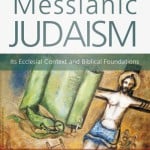 Yesterday I got my hands on my co-blogger Joel Willitts’ co-edited book Introduction to Messianic Judaism and it provides a near definitive treatment of the subject. A fantastic collection of essays on the topic of Jewish believers in Jesus and an incredible cast of contributors. Joel and David have done a superb job in putting this book together.
Yesterday I got my hands on my co-blogger Joel Willitts’ co-edited book Introduction to Messianic Judaism and it provides a near definitive treatment of the subject. A fantastic collection of essays on the topic of Jewish believers in Jesus and an incredible cast of contributors. Joel and David have done a superb job in putting this book together.
Scot McKnight praises the book and raises some good questions about Messianic Judaism and Supersessionism (see #1, #2). A few things I have to say:
1. I delight in this wonderful book for both its theological acumen, ecumenical vision of Jewish and Gentile believers united in faith in Jesus, and its responsible approach Jewish-Christian relationships. Likewise important is the affirmation that one can keep a kosher lifestyle and still be a committed follower of Jesus. However, one thing that causes me angst is the premise that while Messianic Jews and Gentile Christians are part of the one ekklesia, still, there is assumption that they inhabit different socio-religious spaces, and Messianic Jews are not actually “Christians.” The impression I get is that Messianic Judaism is presenting itself not simply as an ethnic church group or as a Christian denomination, it is touted as a separate species of Christ-believer, one more entrenched in its Jewish heritage and distinguishable from the Gentile Christians. To be honest – and Joel might push back on this – I think Galatians rules out precisely this kind of vision of believers in Jesus. First, when Paul says that in Christ there is “neither Jew nor Gentile,” he is creating a shared meta-identity where it is union with Christ that is determinative for our relationship with God and to each other, with the result that all walls between these groups are utterly broken down. What is more, Paul particularly wants to avoid any kind of ecclesiology that results in someone insisting on foreskins sit on the left and no-foreskins sit on the right. I think Paul knew of both mixed and parallel groups of Jewish/Gentile Christ-believers, but not two species of believers. Second, despite the aversion to using the word “Christian,” I cannot help but note that Christianoi was originally used for mixed Jewish and Gentile groups in both Antioch (Acts 11:21) and in Asia Minor (1 Pet 5:13). Christianoi means “client or adherent of Christ.”
2. On supersessionism, I strongly recommend Bruce Longenecker’s excellent JTS piece on varieties of supersessionism, an important article on the subject.Now any notion that God has just written off ethnic/empirical Israel and has replaced them with the Gentile Church is ruled out by a straight forward reading of Romans 9-11. Still, we have to be careful to avoid the chief Dispensational error, that is, identifying the church as an entity separate from Israel. The fact is that the story of Israel culminates and continues in the story of the church. So while the church does not replace Israel, nonetheless, it is the church consisting of Jews and Gentiles, united in the Messiah, sealed in the Holy Spirit, which constitutes the Israel of the messianic age, with a concurrent hope that ethnic Israel will be roused to jealousy and will embrace their Messiah.










